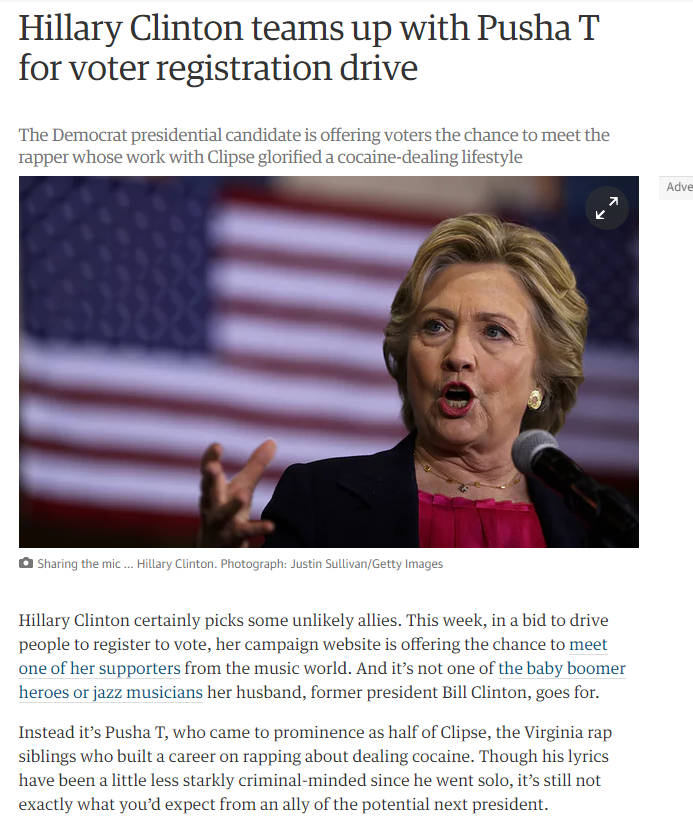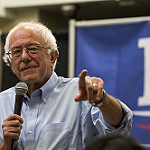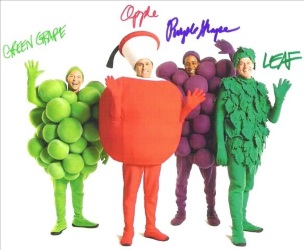Smoke DZA isn’t passing Trump the blunt nor the presidency (image credit: Genius)
If you’re like me, when everyone was talking about the first presidential debate two weeks ago (yes, I realize since that since the first debate Trump has verbally assaulted the female population and the second debate already happened; I blame ISIS for the time delay), you didn’t watch it, had no interest in watching it, and were probably more interested in the spectacle that happened a day later. The fifth episode of FX’s new show Atlanta, created by weirdo rapper Childish Gambino, cast a black man to play Justin Bieber. As in, a black actor is pretending to be Justin Bieber, as opposed to the real life Justin Bieber pretending that he’s black. If you aren’t watching it yet, Atlanta is easily the funniest and likely the best show on TV right now, but it’s also prescient. Although the “black Justin Bieber” is only a hyperbole of cultural appropriation, imagine my surprise when I woke up to this on Facebook a few days later:

image credit: The Guardian
Oh… so to encourage voter registration, Hillary Clinton got a rapper known for his lyrics about drug dealing and gun violence (and McDonald’s) to campaign for her? Is there anything about that in her platform? Can you say “pander”? Granted, Pusha T is hardly the worst co-sign she could have received, as he’s a president in his own right, as head of GOOD Music (formerly run by future presidential candidate Kanye West), and, as an English major, I can say with full confidence that Push is one of the most intelligent coke rappers in hip hop today. But this is only the latest entry into a long list of Hillary’s various “outreach” projects to black communities. Earlier in the week, she was announced as a guest on R&B singer Mary J. Blige’s new Apple Music show The 411, where Blige sung an awkward rendition of Bruce Springsteen’s “American Skin (41 Shots)” (a song about police brutality) to Clinton’s face. Clinton kinda just sits there and takes it.
Like you’ve never seen them before.@MaryJBlige sits down with @HillaryClinton.#The411
Coming September 30th.https://t.co/hbaWqfjJcp pic.twitter.com/P2qpm3h3Pm— Apple Music (@AppleMusic) September 27, 2016
And let’s not forget back in January, when Ellen DeGeneres conspired with Hillary to assassinate the dab on national television. Clinton has a short, embarrassing history of pandering to black audiences in the last year, in order to shake the black community’s lack of enthusiasm with her campaign (her biggest selling point is “at least she’s not Trump”) and engage with younger voters. It should be no surprise to millennials everywhere that, yes, great-granddaddy Bernie Sanders did it better.
 Sanders’ relationship with Atlanta rapper Killer Mike is probably one of the most remarkable political pairings in history. Killer Mike, whose lyrical content is comparable to Pusha T’s, emerged as a national commentator during the rise of the Black Lives Matter movement and became one of Sanders’ most ardent supporters. Unlike most celebrity endorsements, Mike didn’t just lend his name to Sanders’ campaign, but actively organized and appeared onstage at Sanders’ rallies, advised Sanders on his efforts to reach undecided voters, and collaborated with the candidate on a taped six-part interview. There was even some speculation that Sanders would choose Mike as his running mate. When Ta-Nehisi Coates (the guy you do not want coming at you for racial issues) criticized Sanders for his limited view of reparations, Mike gracefully acknowledged Coates’ points while defending Sanders’ position, even managing to get this response:
Sanders’ relationship with Atlanta rapper Killer Mike is probably one of the most remarkable political pairings in history. Killer Mike, whose lyrical content is comparable to Pusha T’s, emerged as a national commentator during the rise of the Black Lives Matter movement and became one of Sanders’ most ardent supporters. Unlike most celebrity endorsements, Mike didn’t just lend his name to Sanders’ campaign, but actively organized and appeared onstage at Sanders’ rallies, advised Sanders on his efforts to reach undecided voters, and collaborated with the candidate on a taped six-part interview. There was even some speculation that Sanders would choose Mike as his running mate. When Ta-Nehisi Coates (the guy you do not want coming at you for racial issues) criticized Sanders for his limited view of reparations, Mike gracefully acknowledged Coates’ points while defending Sanders’ position, even managing to get this response:
For the record @KillerMike as sharp with the insights and the rhymes. Ain’t gotta agree on everything. Shouldn’t agree on everything.
— Ta-Nehisi Coates (@tanehisicoates) January 20, 2016
Less than a month later, Coates admitted that he would vote Sanders.
This isn’t to say that Hillary Clinton has a bad relationship with the black community or even the hip hop community, just a tenuous one. Numerous rappers have come out in support of Clinton, including A$AP Rocky, Pharrell, Young Jeezy, Snoop Dogg, Lil B and Waka Flocka Flame (who, incidentally, also ran as a candidate). She’s also dominating Trump in the black vote, with a historical margin of 92 percent to Trump’s paltry 2 percent. But this probably has less to do with Clinton herself and more to do with her opponent.

Donald Trump, the estranged fifth member of the Fruit of the Loom crew (he disagreed with grape on some cosmetic issues), has had his own complicated relationship with hip hop. His own rise to national prominence in the 1980s more or less coincided with hip hop’s emergence as popular culture, and, consequently, his name has been a commonplace metaphor in rap lyrics to represent wealth – a timeless subject in rap. Thus, there is at least some truth to Trump’s maligned 2011 statement that he has “a great relationship with the blacks” (granted, I’m pretty sure Trump thinks all black people are rappers).
Ironically, he’s gotten into scuffles with white rappers – back in 2011 Mac Miller released his breakout song “Donald Trump“, which Trump himself praised, then later changed his mind and threatened to sue Mac Miller for using his name in the song. Unfortunately, despite the many things you can sue someone for, you can’t actually sue someone just for using your name in a song. Mac Miller responded this year in a rant on The Nightly Show With Larry Wilmore, where he mostly recycled a lot of the criticisms we’ve already heard about Trump. Still, it’s kind of funny when your biggest fan from five years ago tells you to go fuck yourself on national TV (even if nobody was watching).
The trend of revoking Trump’s ghetto pass is spreading throughout hip hop. This year, YG released a song called “FDT” (the DT stands for “Donald Trump”; you can guess what the “F” is) where he noted having lost his past respect for Trump. And to make sure nobody misunderstood what “FDT” meant, he put out a Part 2 just to clarify his statements.
Rae Sremmurd, the party trap duo that doesn’t think of “polls” in the same way the candidates do, released a song called “Up Like Trump” back in late 2014 , which uses Trump’s name to represent the group’s financial prosperity. By March 2016, they’d had a change of heart, performing “Up Like Trump” at SXSW with the caveat “Fuck Donald Trump” and voicing their support for Bernie. Taking it a step further, they currently refuse to perform “Up Like Trump” at their concerts. In an analysis of the music video for “Up Like Trump”, an ostentatious display of wealth typical to rap with a noted abundance of people wearing Donald Trump masks, Vulture‘s Frank Guan described it as “a manifestation of the devilish bargain rap entered into when, by worshiping money and its display over all else, it achieved domination over the nation’s popular culture”. If that’s so, hip hop must be undergoing an exorcism.
This is made more clear in a recent (and remarkably convenient for the purposes of this particular post) study by FiveThirtyEight, the same site which correctly predicted the polling results for the 2012 presidential election. The site ran an analysis of the uses of the presidential candidates’ names in rap lyrics and rated them as “positive”, “negative”, or “neutral”. Trump unsurprisingly came out far ahead, with 266 references to his name and 60% positive, while Clinton trailed with 17% positive (and almost a third were negative), although the writer Allison McCann notes that this is likely more due to Clinton being a woman. The most interesting data is that Trump only had eight negative references until 2015, where he rocketed to 34. In other words, the same way Trump forgot that he was a birther, forgot to ask Mexico to pay for his wall, and forgot that he donated twice to Clinton’s campaign, hip hop is now trying to forget Donald Trump.


